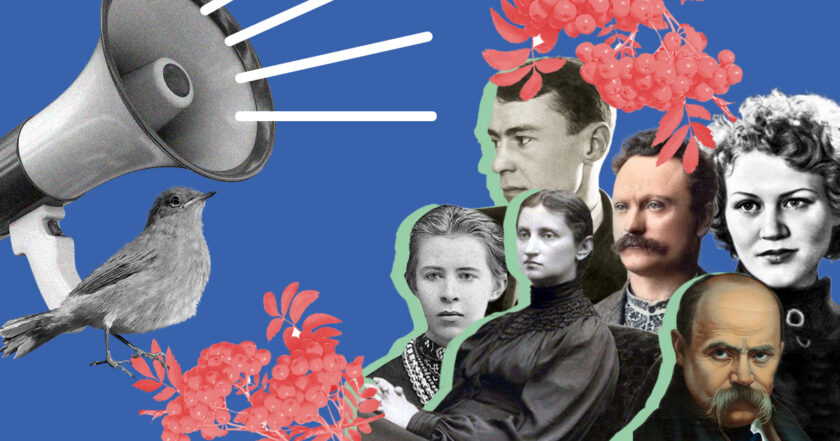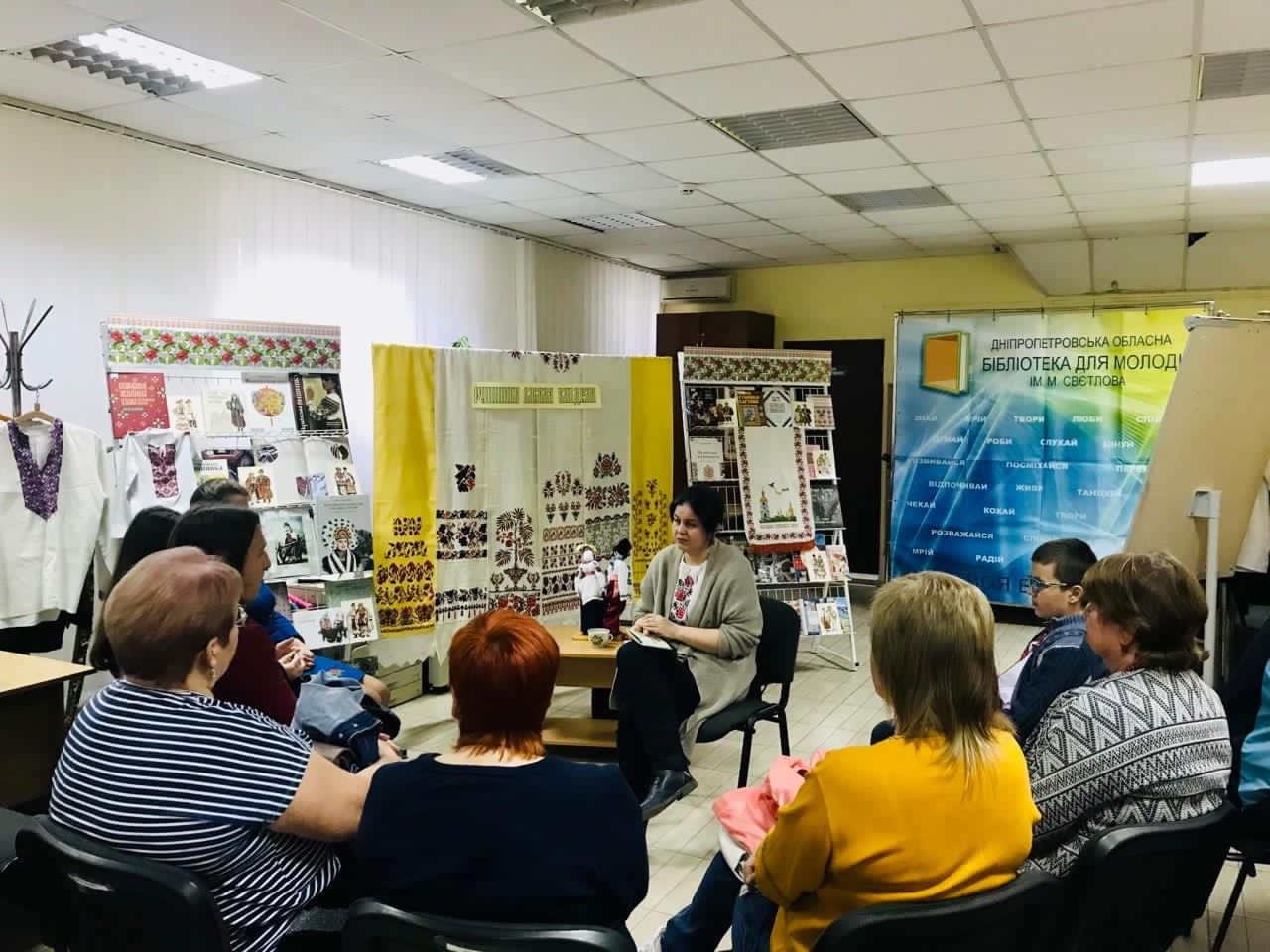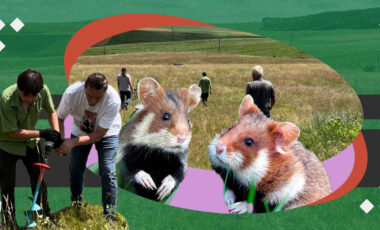How and where to master Ukrainian language. Your guide to fluent Ukrainian
The path to good Ukrainian lies through bad Ukrainian. Surprised? Philologists and teachers believe so. We tell you everything you need to know to continue improving your Ukrainian. Save it — there is a lot of useful information here.

Life hacks for language learning
A few life hacks from Artur Proidakov, Ukrainian language teacher, Global Teacher Prize Ukraine 2021 winner:
- Set the Ukrainian language on gadgets.
Phones, tablets, and computers are things we have in front of our eyes all the time. Therefore, constant interaction with the Ukrainian interface is already a great help in learning the language. You can replace it in the settings in literally two minutes, and the effect will be striking.
- Switch to Ukrainian in social networks.
A very effective tool. Write posts and comments in Ukrainian, and correspond in messengers. And if you have a Ukrainian-language interface, Facebook will often offer you automatically translate posts written in russian into Ukrainian. Over time, you won't even notice how common it is to use Ukrainian on the Internet.
- Subscribe to Ukrainian-language bloggers or Telegram channels.
Surround yourself with Ukrainian information space.
- Listen to Ukrainian podcasts and watch movies and series in Ukrainian.
It is how you can get used to spoken language, remember accents, and correct pronunciation of words.
- Take online Ukrainian language courses or watch educational videos on this topic.
- Create your own dictionary.
You can do this in notes on your phone or by purchasing a notebook for inspiration and writing words or whole expressions. Try to expand your vocabulary. And then, be sure to integrate the new vocabulary into your everyday use so that the words become familiar.
- Read Ukrainian books aloud to practice speaking.
- Speak Ukrainian in public places.
Do not be afraid to make possible lexical errors during communication. It's okay to make mistakes. It is worse not to try at all. Therefore, make it a rule to take Ukrainian with you when you leave home.
- Communicate with children in Ukrainian.
Your participation and partnership in the learning process are crucial for the child. It is useful to watch videos together, read the same books, and then discuss them. Try to turn this shared time into some challenge. And then children will be happy to join you and your initiatives.
Artur Proidakov says: "I have a phrase that I consistently use in classes: "Everything will be fine!" However, before, I always said it at the end of the class when I warned that next time there would be a test or some large-scale work. Today, this phrase takes on new meanings — the learning process should turn into experimentation and comfort space. For me, it is important that Ukrainian is perceived through the language of social networks, music, and modern art. Then students realize that it's not about textbooks or rules, it's about what's around, our life today and the future."
Are you sure we will succeed?
How to improve your Ukrainian?

Dnipropetrovsk regional library for young people named after M. Svetlov conducts meetings and classes for those willing to improve the Ukrainian language. It is a volunteer project. Age, gender, and mastery level of the native language do not matter. Iryna Pasko, the candidate of philological sciences, is the head of this Ukrainian Conversation Club.
What does Iryna Pasko advise?
From Ms. Iryna's experience, there are three main reasons for the slow transition to Ukrainian:
- A person cannot switch to Ukrainian because they lack vocabulary.
It is where the advice on content helps. Reading, listening, and watching films with Ukrainian dubbing or in Ukrainian expands passive vocabulary. If there are some words you hear for the first time, you can Google them and write them down, find out their meaning, and make sentences with them. If the level of Ukrainian is low, you should not be ashamed to start with books for children, simple texts, and cartoons, after all. If you don't know where to get them, the librarians will help (it's free!). There is a search on book websites. It helps a lot to read and watch things interesting for you. If you like to cook — read recipes, watch culinary vlogs in Ukrainian, etc. The topic will "support" interest in the language.
- Even if vocabulary is okay, a person is not used to speaking Ukrainian.
So you need to make passive vocabulary active! And there is only one way to this — to speak. At first, it is very difficult for many to put their thoughts together and choose the right word. People are usually silent and nervous. They switch to russian because they are afraid they are taking up the interlocutor's time, delaying them, and then "lose" their thoughts completely. Iryna Pasko advises starting with written texts — on social networks, in comments.
And further, or meanwhile, find a friendly interlocutor with a good level of Ukrainian who would be ready to listen, give suggestions, and constantly positively reinforce your efforts. It could be a friend, a buddy, a volunteer, a family member — anyone who agrees. People who are switching or learning a language say that, in the initial stages, one-on-one conversations are much more productive than group ones. There is always a lack of time for everyone in the group, polite people are afraid to burden others with their slowness, and tactless ones, on the contrary, fill time with themselves. It can really annoy other participants. The role of the club manager is significant here. Now, there are more and more such clubs — there are three or four only in Dnipro. Most of them are free — you can choose something to your liking or attend all of them.
- A person is not supported by a russian-speaking environment, and there is no Ukrainian-speaking environment.
- If you can find a group of people engaged in a certain business together, do not tolerate russian, but encourage Ukrainian, try to join them. You will constantly hear conversations on everyday and political topics, and you will be able to pick up certain ready-made language structures and, if possible, express your opinion. "I have personally seen such an atmosphere in groups of volunteers weaving camouflage nets. This is monotonous work, during which you can talk," adds Ms. Iryna.
- It is also significant to accustom yourself to speaking Ukrainian consistently in certain situations: asking for a stop in transport, answering questions about packages and checks at the cash register in supermarkets, ordering coffee in coffee shops, etc.
- If it's hard to do it all the time and if you sometimes stutter, don't beat yourself up for it: yes, it didn't work out, but next time, everything will be ok. The path and goal are important, but the pace can be individual. "Sometimes, out of inertia, I answer in russian to people who address me in russian. And this is not surprising because, despite the war, we are surrounded by the hell of the russian language, especially in russified cities. You can automatically switch to your native language in an extreme situation, for example, when you are hurt or scared. Don't eat yourself alive for every such case," Iryna Pasko advises.
- There is a lot of talk about switching to Ukrainian in family conversations, but in reality, it is a very complex topic. The family knows a person better than anyone, but relatives can criticize the most unpleasant things — and families are different. Iryna Pasko explains: "We will not consider the extreme case when the family supports the "russian world," and you the only one sane there. But perhaps the family is pro-Ukrainian, but it has always spoken russian, which was considered a sign of civilization due to the USSR colonial policy. Probably then, it is worth starting with culture itself — listen to history lectures on YouTube together, listen to music, and read simple texts. Shortly, try to create shared content for discussion. My interlocutors at the club admit that they are often encouraged to speak Ukrainian by children who realize the importance of the language for the nation's consolidation. One of our participants was afraid she would be laughed at by her sister, who did not answer in Ukrainian even in the family chat. But during the real meeting, it turned out that she was completely supportive and tried to answer in Ukrainian. She was just waiting for an example. Sometimes someone has to be the first, set an example."
- There is also another case. Ms. Iryna gives an example: "The family speaks surzhyk (a mixture of Ukrainian and russian languages), so "pure" Ukrainian is perceived as "showing off." Here it is necessary to clearly explain to the family what surzhyk is, why it is a consequence of russia's colonization policy, and why we must gradually eradicate this phenomenon. I personally am not against surzhyk as an artistic medium, but we should gradually clean up the phenomenon and the reasons that gave rise to it."
- On the contrary, sometimes people can discuss professional topics at a high level of language proficiency but pass in front of purely everyday topics. "According to experience, this happens due to the switching of language codes, let's say: "Ukrainian — for work, and russian — for rest, to distract yourself." It is difficult to change this attitude, but it is worth trying at least a little to talk about simple things in Ukrainian: shopping, cleaning, planning leisure time, etc."
How to motivate yourself to switch to Ukrainian?
Learning how to speak a language is a never-ending process. We can improve our mastery of any language, our first, second, third, or tenth, daily throughout our lives — and that's okay. But you can set specific tasks for yourself and write down your motivation. It helps a lot. As an example:
- I want to switch to Ukrainian in order to distance myself from the russian world.
- I want to switch to Ukrainian because it is the language of my childhood, which I have lost.
- I want to switch to Ukrainian to feel a stronger connection with my national roots.
- I want to switch to Ukrainian for work, etc.
Motivation depends on what you do first: learn the terminology you need for work or learn to say hello and tell about your day if you just want to talk about everything in the world, but you are just starting your journey.
Iryna Pasko advises: "It's very cool to speak Ukrainian to yourself — it's not schizophrenia, it's an exercise. Describe to yourself what you saw, and imagine yourself in a certain role. The habit of thinking in a certain language does not arise immediately, and, of course, if 90 % of the people around speak russian, it is strange to demand from yourself mind-blowing results on the 21st day (they say that a habit is formed in three weeks)."
"The main thing," the teacher emphasizes, "is not to despair, to remember your motivation, to check whether it has changed." If you know why you are doing all this, eventually, something will work out. The path to good Ukrainian lies through bad Ukrainian. If you switch to Ukrainian — you are amazing. There will always be people who will support you."
More useful decisions!
Where to learn Ukrainian?
"Rubryka" has collected a useful selection of various resources for learning the Ukrainian language.
Where to learn:
- Ukrainian in 27 lessons. This course is Ukrainian "from scratch." The elementary-level language program has been developed in such a way as to promote the development of the listener's communicative abilities as widely as possible for the effective use of the Ukrainian language in various life situations and spheres of communication.
- Ukrainian language is the course, designed for 6 weeks. It has everything: phonetics, spelling, lexicology, phraseology, and word structure. Half of the course is devoted to morphology, without studying which you cannot know any language. The course will be useful for high school students, university applicants, students, and adults who would like to recall school knowledge.
- E-language. The purpose of this course is to immerse the listener in the elements of the Ukrainian language, promoting the development of their communicative abilities for the effective use of the Ukrainian language in various life situations and spheres of communication. The program consists of six blocks according to the level of language proficiency of the course participant.
- Language DNA of the Nation is an educational project for those who want to improve their knowledge of the Ukrainian language. The project founders share their love for their native language and dream that one day it will be cool in Ukraine to know several languages and speak Ukrainian.
- Express lessons in Ukrainian are small video lessons from Oleksandr Avramenko. They are only one and a half to two minutes long, but they will teach and entertain with very unexpected curiosities.
- Lifehacks on the Ukrainian language is an online course in the form of useful tips (lifehacks) that will help trace the history of the art of words development from folklore and the first written works to modern Ukrainian literature, master basic theoretical and literary concepts, develop skills in the analysis of works of art.
- United is 28 days of support in the transition to the Ukrainian language. Participants will receive daily tasks and educational materials that will help overcome the language barrier; will participate in webinars and speaking clubs in their city.
For foreigners, the Duolingo app is convenient, where you can learn the Ukrainian language from scratch in a game form. YouTube channels will also be very helpful:
What to read?
The "Learn Ukrainian" initiative made a small selection of books that will help you get a better feel for Ukrainian and speak it more confidently:
- Наталія Клименко, Павло Мельник-Крисаченко. "Українська легко!"
- "Антисуржик" (edited by Олександри Сербенської)
- Ольга Дубчак "Чути українською", "Бачити українською"
- Ірина Зубрицька, Тарас Береза, Юрко Зелений "Мова — не калька. Словник української мови"
- Іван Нечуй-Левицький "Кайдашева сім'я"
- Василь Шкляр "Чорний ворон"
- Любко Дереш "Пісні про любов та вічність"
- Артем Чех "Район Д"
- Чак Поланік "Створи щось" (translated by "Клуб сімейного дозвілля")
- Дж. К. Ролінґ "Гаррі Поттер" (book series translated by "А-ба-ба-га-ла-ма-га")
Learn via playing!
- Slovko is the Ukrainian version of the popular English-language game Wordle. The game is updated daily and offers users six attempts to guess a word consisting of five letters.
- Also, at the end of January, Kyiv programmer Oleksandr Kozlov translated the Wordle game into Ukrainian and created an app for iOS users called "Kobza."
Websites and services
- Goroh is an online library that contains the most useful Ukrainian language dictionaries.
- GRAC is a large, representative, structured collection of texts in Ukrainian in accompanying programs, allowing you to build your own subcorpora on the basis of the corpus, search for words, grammatical forms, and their combinations, as well as process search results, sort, make balanced choices and receive various statistical information.
- On Slovopedia you can find words from Ukrainian explanatory dictionaries.
- The official website of the Ukrainian language contains various rules, including spelling.
- With the help of the LanguageTool program, you can check grammar and punctuation in Ukrainian texts, as well as learn the basic rules.
- OnlineCorrector will help you create texts in Ukrainian without errors.
- And in the Slovotvir collective dictionary, anyone can find the meaning of words of foreign origin, as well as their Ukrainian equivalents.
























































